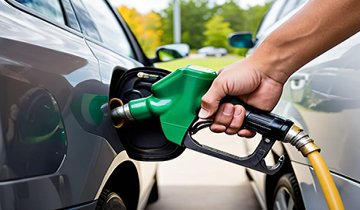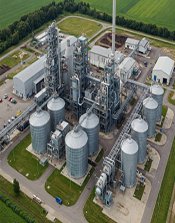Published: August 06, 2015 | Updated: September 18, 2025
Published: August 06, 2015 | Updated: September 18, 2025
The Complete Guide to Ethanol: Unpacking the Biofuel Story
Decoding Ethanol: A Deep Dive into the Biofuel
 Years ago, the term "ethanol" buzzed through conversations, touted as a promising contender against traditional fossil fuels. This biofuel emerged as a potential game-changer in the energy landscape, with expectations high for it to capture a significant portion of the gasoline market. Today, while the initial fervor may have subsided somewhat, ethanol continues its quiet work behind the scenes. This discussion aims to unpack the biofuel story and explore the multifaceted world of ethanol, examining who benefits from its use and what the future holds for this once heavily praised biofuel.
Years ago, the term "ethanol" buzzed through conversations, touted as a promising contender against traditional fossil fuels. This biofuel emerged as a potential game-changer in the energy landscape, with expectations high for it to capture a significant portion of the gasoline market. Today, while the initial fervor may have subsided somewhat, ethanol continues its quiet work behind the scenes. This discussion aims to unpack the biofuel story and explore the multifaceted world of ethanol, examining who benefits from its use and what the future holds for this once heavily praised biofuel.
What Exactly Is Ethanol Fuel?
Ethanol fuel, also known as ethyl alcohol, falls under the category of biomass fuels. Producers create it from renewable biological sources, with corn currently standing as the most popular feedstock. This versatile fuel serves a dual purpose: it functions as a direct substitute for gasoline in specially designed vehicles, and it acts as a valuable additive to conventional gasoline.
When blended with gasoline, ethanol introduces oxygen, which aids in a more complete combustion process and consequently reduces harmful air pollutants emitted from vehicle exhaust. In the United States, a common blend known as E10, comprising 10% ethanol and 90% gasoline, permeates the vast majority of fuel pumps. Higher concentration blends, such as E15 and E85 (a high-level ethanol blend), exist but necessitate the use of newer vehicles or flexible fuel vehicles (FFVs).
Remarkably, approximately 95% of all fuel consumed in America incorporates ethanol, indicating its widespread impact on nearly every driver. An estimated 20 million FFVs currently operate on American roads, possessing the capability to utilize these higher ethanol blends.
However, a significant bottleneck exists: the limited availability of fueling stations that offer these high-ethanol options. This infrastructure gap prevents many FFV owners from fully capitalizing on this alternative fuel.
The Upsides of Ethanol Usage
The integration of ethanol and ethanol-blended fuels yields numerous advantages for the average driver and businesses operating vehicle fleets for shipping or transportation purposes.
- A fundamental benefit of ethanol lies in its renewable nature. Unlike finite fossil fuels extracted from the earth, ethanol originates from crops that farmers can grow and replenish annually. This inherent renewability positions ethanol as a more sustainable energy source over the long term.
- Ethanol exhibits cleaner burning characteristics compared to traditional gasoline. During combustion, it tends to produce fewer particulate emissions and other harmful byproducts, contributing to improved air quality in urban areas.
- Ethanol combustion results in lower net carbon dioxide emissions and significantly less carbon monoxide compared to gasoline. While the entire lifecycle of ethanol production and use involves carbon emissions, the carbon dioxide absorbed by the growing crops partially offsets the emissions released during combustion. This makes ethanol a potentially less carbon-intensive fuel source.
- Beyond cleaner burning, ethanol offers other environmental advantages. Its biodegradability means that accidental fuel spills pose a less persistent environmental threat compared to petroleum-based spills, as natural processes can break down ethanol more readily.
- The ethanol production process yields valuable byproducts, such as distillers' grains, which serve as a protein-rich animal feed. This coproduct stream enhances the overall economic viability and sustainability of ethanol production.
- The current fuel infrastructure can accommodate ethanol blends with minimal modifications. The existing pipeline and storage systems can handle lower-level ethanol blends like E10, facilitating its widespread adoption without requiring massive overhauls.
- Ethanol production within the United States contributes to reduced dependence on foreign oil imports. By fostering a domestic biofuel industry, the nation can enhance its energy security and insulate itself somewhat from the volatility of global oil markets.
Discover how streamlined maintenance processes can elevate production. Learn more.
The Challenges Associated with Ethanol
Despite its advantages, ethanol also presents certain drawbacks that warrant careful consideration.
- Ethanol's corrosive properties make its transportation more challenging compared to gasoline. Special materials and handling procedures are necessary to prevent damage to pipelines and storage tanks, which can increase transportation costs.
- Ethanol's hygroscopic nature, meaning it readily absorbs water, poses a risk of fuel contamination. Water contamination can lead to phase separation in ethanol-gasoline blends, rendering the fuel unusable and potentially damaging vehicle fuel systems.
- Ethanol possesses a lower heat of combustion compared to petroleum. This translates to lower fuel efficiency, meaning vehicles operating on ethanol or ethanol blends may experience reduced miles per gallon compared to running on pure gasoline. This decrease in fuel economy can partially offset the cost benefits of ethanol.
- The large-scale production of ethanol, particularly when relying heavily on corn, demands significant tracts of arable land. This can lead to competition with food production, potentially driving up food prices and raising concerns about land-use sustainability.
- While ethanol offers some environmental benefits, its production is not without its own environmental footprint. Practices such as intensive farming, including the use of fertilizers and pesticides, can contribute to soil erosion and nutrient runoff, impacting water quality.
- A critical concern surrounding ethanol production involves the energy required for its creation. If the process of growing, harvesting, and converting crops into ethanol consumes nearly as much energy as the resulting fuel provides, the net energy benefit diminishes significantly. Ideally, ethanol production should utilize renewable energy sources to maximize its sustainability.
Leveraging CMMS for Enhanced Ethanol Production Efficiency
Ethanol production, a complex process involving numerous interconnected systems and pieces of equipment, benefits significantly from the implementation of a Computerized Maintenance Management System (CMMS). This technology acts as a central nervous system for maintenance operations, empowering ethanol producers to proactively manage their assets and minimize disruptions.
By digitizing maintenance workflows, a CMMS replaces cumbersome paper-based processes, creating a more organized and responsive maintenance environment. This shift allows maintenance teams to move beyond reactive fixes and embrace a more predictive and preventative approach, ultimately contributing to greater operational stability and output.
Proactive Maintenance Strategies
A CMMS enables ethanol plants to schedule and track preventative maintenance tasks with precision. Instead of relying on reactive repairs after equipment failure, the system facilitates the creation of recurring maintenance schedules based on factors like equipment run-time, calendar dates, or meter readings. The CMMS helps maintenance managers generate standardized work orders, assign tasks to technicians, and track work order statuses.
This proactive stance reduces the likelihood of unexpected breakdowns, which can lead to costly downtime and production losses in a continuous-flow industry like ethanol production. Furthermore, the system records the history of maintenance performed on each asset, providing valuable data for identifying recurring issues and refining maintenance strategies over time.
Improved Resource Management and Cost Control
Efficient resource allocation stands as another key advantage of using a CMMS. The system provides a clear overview of available maintenance personnel, their skills, and their current workload, allowing for optimal task assignment and scheduling. This prevents bottlenecks and ensures the right technician with the necessary expertise handles each job.
Moreover, a CMMS facilitates better inventory management of spare parts and materials. By tracking part usage and stock levels, the system helps avoid stockouts that can delay repairs and minimize overstocking, which ties up capital. Detailed records of labor costs, parts expenses, and equipment downtime, captured by the CMMS, provide valuable insights into maintenance spending, enabling producers to identify areas for cost reduction and improve budget forecasting.
Enhanced Compliance and Safety
The ethanol production industry operates under stringent regulatory requirements concerning safety and environmental protection. A CMMS assists in maintaining compliance by providing a centralized platform for managing safety procedures, tracking inspections, and documenting adherence to regulations. The system can store safety protocols, generate checklists for safety inspections, and record any safety-related incidents.
Furthermore, by ensuring equipment operates reliably through proactive maintenance, a CMMS contributes to a safer working environment for plant personnel. Detailed audit trails within the system provide a comprehensive record of all maintenance activities, which proves invaluable during regulatory audits and demonstrates a commitment to safety and compliance.
 The Trajectory of Ethanol in the Future Energy Landscape
The Trajectory of Ethanol in the Future Energy Landscape
As global reserves of fossil fuels continue their inevitable decline, the search for viable alternative energy sources will intensify. Consequently, biofuels, including ethanol, are poised to maintain their relevance in the energy mix for the foreseeable future. Projections once anticipated that ethanol-based fuels would constitute a substantial portion of total fuel production. While the exact figures may fluctuate, the underlying trend toward greater biofuel adoption appears likely to continue.
Currently, corn serves as the primary feedstock for ethanol production in many regions. However, researchers actively explore other renewable crop options that hold significant promise as future ethanol sources. These include sugar cane, which boasts high sugar content readily convertible to ethanol, and cellulosic biomass, encompassing a diverse range of plant materials like agricultural residues and dedicated energy crops. Switchgrass, a hardy perennial grass, also garners attention for its high biomass yield and low input requirements. Also, innovative research into algae and fungus as potential ethanol sources offers exciting possibilities for even more sustainable biofuel production methods.
Concluding Thoughts: Beyond Bushels and Wrenches
The narratives of ethanol and CMMS, while seemingly distinct, converge on a shared principle: the pursuit of enhanced operational effectiveness within a complex industrial landscape. Ethanol's journey from promising upstart to established fuel component reveals the intricate dance between agricultural resources, energy demands, and environmental considerations.
Similarly, the adoption of a CMMS in ethanol production signifies a move toward greater control and foresight in managing the physical assets that underpin this industry. Both represent proactive approaches to navigating inherent complexities – one in harnessing renewable resources, the other in orchestrating the maintenance symphony that keeps production flowing.
FAQs
What is ethanol fuel and how is it made?
Ethanol fuel is a renewable biofuel made primarily from crops like corn and sugarcane, used as an additive or replacement for gasoline.
Why is ethanol considered a cleaner fuel option?
Ethanol burns more cleanly than gasoline, reducing harmful emissions like carbon monoxide and particulates.
What are the disadvantages of ethanol as a fuel?
Ethanol can reduce fuel efficiency, compete with food crops for land, and requires careful handling due to water absorption and corrosion risks.
How widely is ethanol used in the United States?
About 95% of U.S. fuel contains ethanol, most commonly as E10 (10% ethanol and 90% gasoline).
How can a CMMS improve ethanol production efficiency?
A CMMS helps ethanol plants reduce downtime by scheduling preventive maintenance, tracking inventory, and ensuring regulatory compliance.
Does MAPCON’s CMMS support ethanol producers?
Yes, MAPCON’s CMMS provides real-time maintenance tracking, inventory management, and safety documentation to keep ethanol facilities running efficiently.
MAPCON | 800-922-4336
MAPCON CMMS software empowers you to plan and execute PM tasks flawlessly, thanks to its wealth of features and customizable options. Want to see it for yourself? Click the button below to get your FREE 30-day trial of MAPCON!
Try It FREE!